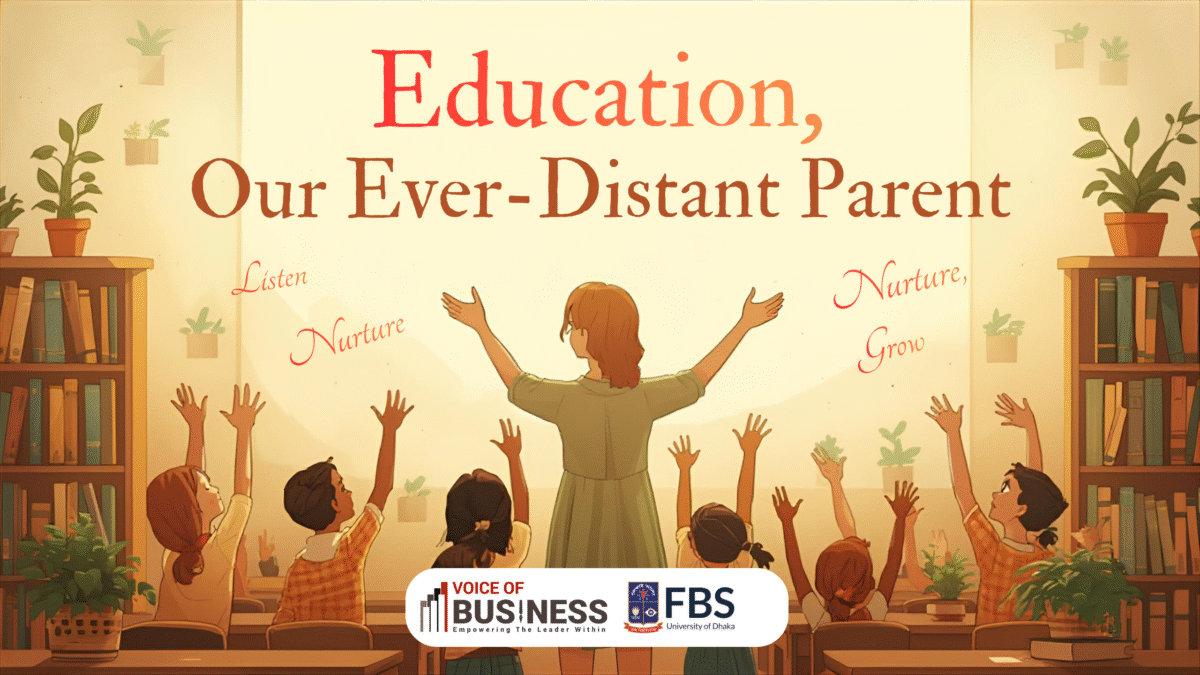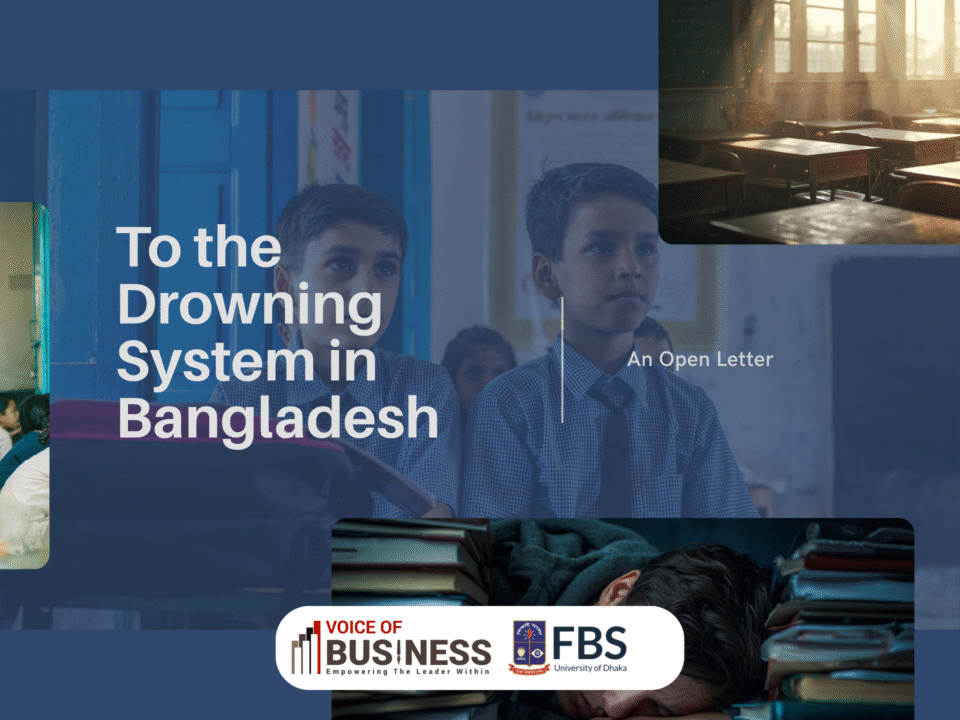Education, Our Ever-Distant Parent

DEGREES WITHOUT DIRECTION
August 24, 2025
Propaganda I’m not falling for: The Bangladeshi Dream
August 24, 2025Dear “Education” – our second parent,
We plead to you as your children — long raised under your care, disciplined by your rules, moulded by your quirks. After all these years, we can say, you provided – yes. But you did not listen. You ensured our stomachs were filled with degrees and syllabi, but you forgot to notice our hunger for meaning, value, and guidance.
You increased enrolment rates in primary education from 62.9% in 2000 to over 97% by 2013. You fought for gender parity, and in many cases, won. You provided stipends, free books, midday meals – as a father, you brought food to the table. You saw the need to bring every one of us under the same umbrella. So, you built schools. You posted numbers. We acknowledge that. [1]
But dear Education, when did you last sit down beside us and listen?
You never asked why a classroom full of children often feels so empty. You never noticed how our teachers — underpaid, untrained, and overburdened — repeat the same notes year after year without ever being taught how to teach.[3] You never asked why, even after finishing five years of primary school, nearly half of us couldn’t solve basic arithmetic problems or read aloud from books fluently.[1] You never stayed up with us the night before board exams, when the pressure of memorizing essays from “Advanced Learners” crushed our ability to write our own words. You reduced our worth to grades, shaped schools into factories, and made teachers hostage to test results. You say the curriculum aims for “communicative competence,” yet the exams are solely demonstration of memorization through writing; no room for thought, voice, or wonder.[3] And so, we memorize. We coach. We fear. We pass — but we do not grow.
You outsourced your presence to coaching centers. You left us in the hands of private tutors, who sometimes taught more in two hours than schools did in five days. Yet they could not show us a better path of academic achievement other than the one you created, sometimes even making it worse. Is this how a parent should care — from a distance, through others? And why should some of us flourish because they have the money to afford tutoring? Yes, dear Education, inequality haunts your house. In rural homes, the return on education remains uncertain. Those who live close to schools, whose families can pay for tutoring — they advance. The rest trail behind. [2]
You continued to introduce new curriculums, new contents, new infrastructures without giving the means to utilize them – books without exercises, labs without quality equipment, libraries without useful books, new methods without training. Dear education, we do not want to see flashy steps or
immediate action. We want a properly functioning curriculum with all its elements. You do not have to do everything from scratch following other countries. You just need to build on what we always had – a simple curriculum – but with proper values, improved pedagogy, emphasis on learning & adaptiveness, and adopting teaching with care. When our mothers shout at us, we slowly curl up into small areas and forget to explore. Give us the opportunity to see the world with open eyes. This letter isn’t written in anger. It’s written in hope. Because we still believe in you. We want you to listen – to pave the way to a better destination: Prioritize teachers’ training and establish teaching as a noble profession with good wages and benefits. Teaching is not just about content — it’s about pedagogy,
empathy, and responsiveness. Make pedagogy a national conversation. Bring in the meritorious minds of the nation to work in this profession.
Secondly, exams shouldn’t feel like trials, rather reflect actual learning. Improve our exam system to evaluate ideas, critical thinking, analytical reasoning; not just recalling. Then, introduce portfolio based assessments and continuous evaluations with a structure that both students and teachers understand fully. A child who is scared to fail cannot truly learn. Introduce mental health support in schools. Train teachers to care, not just teach. Train them to deal with toxic parents.
Last but not least, quality of education must not depend on geography or social status. Schools should not be battlegrounds of political interests. Make a simple curriculum that can cater the students in a cottage in the farthest village to the ones in the high-rises of Dhaka. Make a good governing body in the local levels to monitor the activities of schools and assist them in the shortest possible time.
Don’t just give us blank hope – create a real timeline and proper planning to implement each of these step-by-step.
Live up to it. Don’t just raise us. Raise us well.
With hope,
Your Children,
who want to Learn, not Just Survive
References:
1. Kono, H., Sawada, Y., & Shonchoy, A. S. (2017). Primary, Secondary, and Tertiary Education in Bangladesh: Achievements and Challenges. Economic and Social Development of Bangladesh, 135–149.
2. Moniruzzaman, Md., & Emran, S. J. (2021). Education and Inequality in Rural Bangladesh: A Longitudinal Study. Asia-Pacific Journal of Rural Development, 31(1), 37–61. https://doi.org/10.1177/10185291211010867
3. Al Amin and Greenwood. (2018) The examination system in Bangladesh and its impact: on curriculum, students, teachers and society. Language Testing in Asia 8:4
Author: Ahsanur Razee
Position: 2nd Runner Up (WC 2025)
Institiution: Department of Microbiology, University of Dhaka




